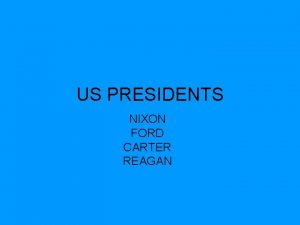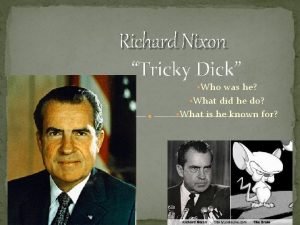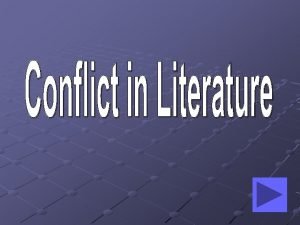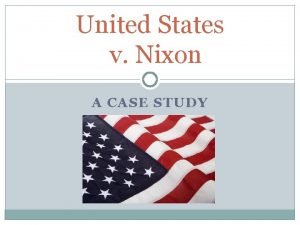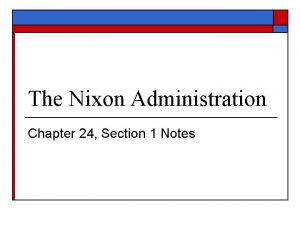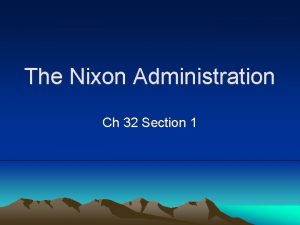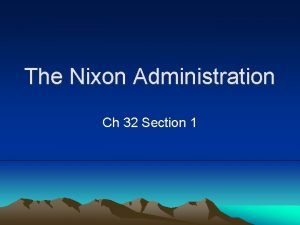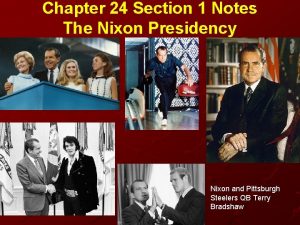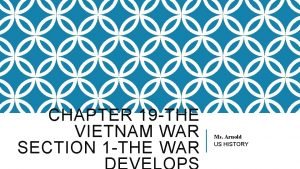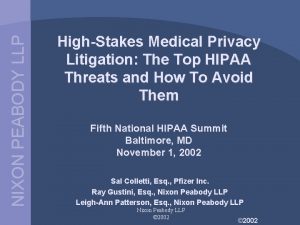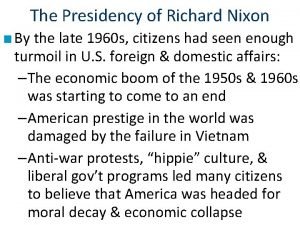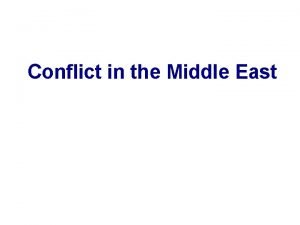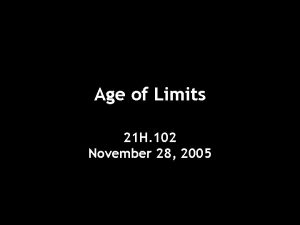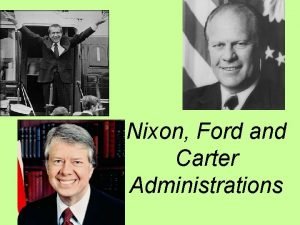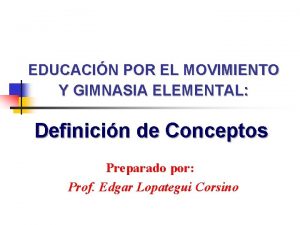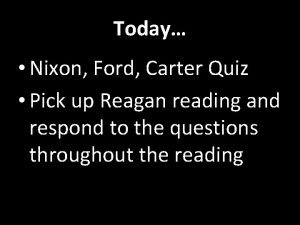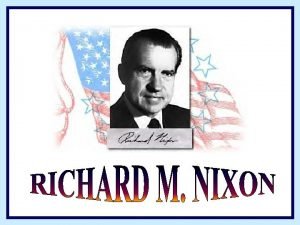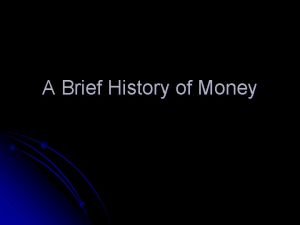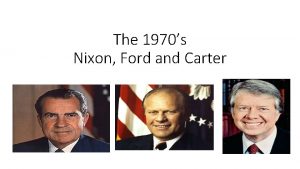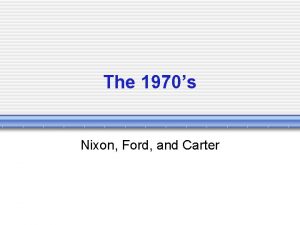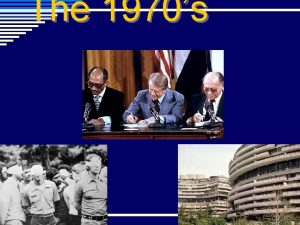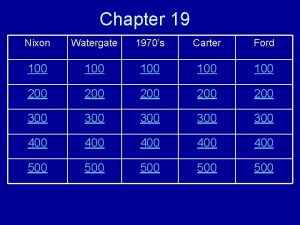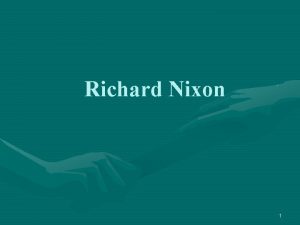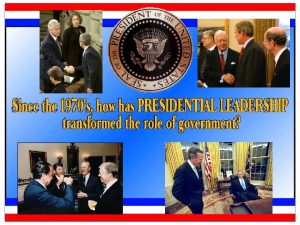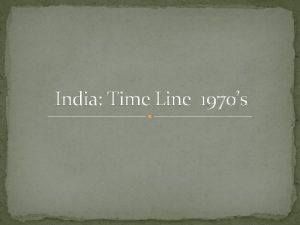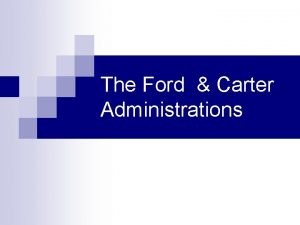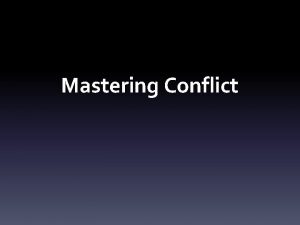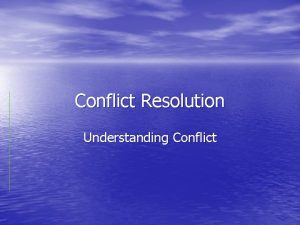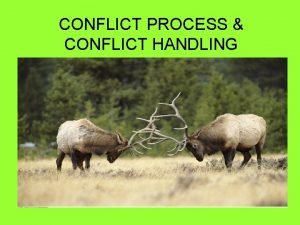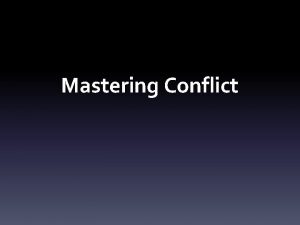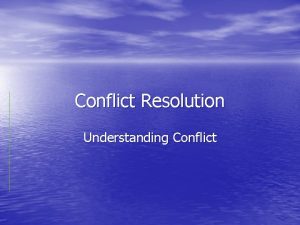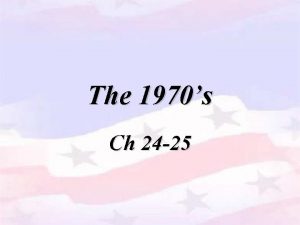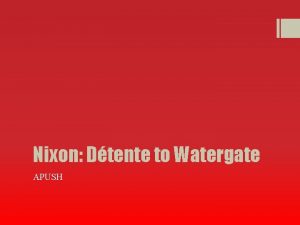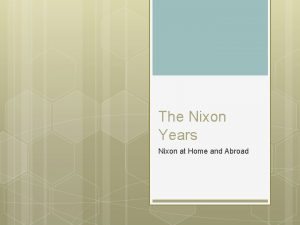Unit 12 1970s Conflict and Change Nixon Ford






























- Slides: 30

Unit 12 1970’s Conflict and Change Nixon, Ford and Carter

Nixon Presidency 1969 -1974

Nixon Presidency (19691974) Richard Nixon began what is known as the Imperial Presidency --Presidential power and influence reaches its peak (Radio & TV allow direct access to voters, President uses more advisers instead of cabinet members that need Congressional approval) with Nixon and he used it to move the country in a more conservative direction.

Nixon Presidency (19691974) Nixon began US withdrawal from Vietnam -In 1972 Equal Rights Amendment (cannot deny equal rights on account of sex) approved by Congress, but never ratified by states -To deal with Inflation(rising prices), Nixon imposed temporary price and wage controls, and took US off gold standard with shift toward fiat money -Nixon eliminated several Great Society programs and gave the money to state and local governments.

Nixon Presidency (1969 -1974) During Nixon’s term in office you had several Supreme Court decisions that protected the first amendment rights of individuals -Tinker V Des Moines: Supreme Court ruling that School districts could not suspend students for wearing armbands protesting the Vietnam War because it violated their first amendment rights. -Wisconsin V Yoder: US Supreme Court struck down a Wisconsin state law that required Amish students to attend school beyond 8 th grade because it violated Amish parent’s religious beliefs under the 1 st amendment and conflicted with Amish values and ways of life. �

Nixon Presidency (1969 -1974) In addition Nixon ended the draft, increased anticrime laws, and broadened environmental laws and agencies. -Environmental Protection Agency-a government agency that protects Americans’ health and the natural environment by setting and enforcing pollution standards -Endangered Species Act--requires the Fish and Wildlife Service to list plants and animals that are threatened with extinction and then take steps to protect them �

Nixon Presidency (1969 -1974) � Nixon believed that the President’s most important role was directing foreign policy. He was greatly assisted by his closest advisor Henry Kissinger in deciding US foreign policy during the 1970’s.

Nixon Presidency (1969 -1974) � Since China became Communist the US had refused to have any diplomatic ties. Nixon restored US diplomatic relations with China. In 1972, Nixon became the first US president to visit the Chinese mainland, this opening of relations with China was Nixon’s greatest foreign policy achievement.

Nixon Presidency (1969 -1974) Nixon wanted to pursue a policy of détente (relaxing tensions) with the Soviet Union. -Nixon signs SALT I, an agreement to limit the development of missile systems. -He also sold American grain to Russia to ease food shortages. -Also, when war breaks out in the Middle East the US and USSR both help to arrange a cease fire. �

Nixon Presidency (1969 -1974) � In 1973 Nixon’s Vice President Spiro Agnew resigned when it was discovered that he took bribes as governor. -Using the 25 th amendment Nixon appointed Gerald Ford as his new Vice-President

Nixon Presidency (1969 -1974) in 1972 a group of former CIA agents working for Nixon’s reelection for President were caught breaking into Democratic Party headquarters in the Watergate Complex in Washington DC. -This incident is going to cause the greatest scandal of Nixon’s presidency. �

Nixon Presidency (1969 -1974) Nixon immediately begins to cover up the investigation of Watergate by saying that it involved National Security. -The links between the White House and the break in are reported by two reporters. -This causes both the Senate and attorney general to launch investigations. �

Nixon Presidency (1969 -1974) During the investigation aides to the President testified that Nixon had secretly recorded all of his White House Conversations. -The Senate asks for the tapes and Nixon refuses claiming executive privilege. (Congress has no right to question the executive branch without presidential approval) -It goes to court and in US v Nixon (1974) the Supreme Court said that Nixon must turn over the tapes, reaffirming the principle that no one is above the law. �

Nixon Presidency (1969 -1974) When the tapes become public, they reveal that Nixon had lied about his role and involvement in the cover-up. -The House of Reps moves to impeach, fearing removal from office Nixon becomes the first President to resign. �

Nixon Presidency (1969 -1974) Impact of Watergate -Lowered public confidence in government -too much power for president leads to abuse (congress passes laws to restore balance between executive and legislative) -shows US govt is based on laws and checks and balances -two party system works, can watch each other -reaffirms role of press in uncovering govt misconduct -Supreme Court preserves its independence �

Unit 12 1970’s Conflict and Change Nixon, Ford and Carter

Ford and Carter Presidencies 1974 -1981

Ford Presidency (1974 -1976) Gerald Ford becomes President of the United States in 1974 when Nixon resigns, only President who was appointed and not elected -One of his first acts as president was to pardon Richard Nixon, this greatly angered many Americans �

Ford Presidency (1974 -1976) � Ford faces the problem of Stagflation -Partially created by the rise of oil prices -Stagflation is when inflation (rising prices) meets stagnation (sluggish economy)

Ford Presidency (1974 -1976) Organization of Petroleum Exporting Countries (OPEC) was formed in 1960 -In 1973 OPEC imposes an oil embargo on US and Western Europe for supporting Israel in 1973 war -Price of Oil in US skyrockets, and has a significant impact on US economy, prices on food, gasoline, electricity, and heat increase across the nation �

Ford Presidency (1974 -1976) � Ford continued Nixon’s détente policy with Soviet Union -Leads to Helsinki Accords where US, Canada, and most of Europe recognize post WWII borders and respect for human rights

Carter Presidency (1977 -1981) � President Jimmy Carter campaigned and was elected on a promise to clean up Washington D. C. -He also wanted US to set a moral example to other nations

Carter Presidency (1977 -1981) Carter’s Domestic Policy -Created the Department of Energy to deal with energy crisis -US began to create a strategic oil reserve in case of national emergency, tax on large cars -Dealt with stagflation by cutting federal spending �

Carter Presidency (1977 -1981) � Community Reinvestment Act—required banks to make credit available in poor communities -Wanted to prevent the decay of low income neighborhoods

Carter Presidency (1977 -1981) � Carter’s foreign policy -Carter signs the Panama Canal Treaty which returned the canal zone, except for the canal, over to Panama -By the end of the century Panama had total control over the canal and canal zone

Carter Presidency (1977 -1981) � After holocaust, Israel had been the homeland of the Jews since 1948 -US policy had traditionally been very supportive of Israel in the form of economic & military aid

Carter Presidency (1977 -1981) In 1977 Carter invited Anwar Sadat of Egypt and Menachem Begin of Israel to Camp David for peace talks -Under the Camp David Accords Israel returns the Sinai Peninsula to Egypt, and Egypt offers a peace treaty and normal diplomatic relations with Israel �

Carter Presidency (1977 -1981) � Carter initially continues Nixon’s policy of détente -After the Soviet Union invaded Afghanistan, USSoviet Relations deteriorated -US halted grain sales to USSR, boycotted 1980 Olympics, and postponed SALT II

Carter Presidency (1977 -1981) Iran Hostage Crisis begins with the overthrow of the Shah of Iran and his relocation to the US -Iranian students following Ayatollah Khomeini seized the US Embassy and held the staff hostage for 444 days �

Carter Presidency (1977 -1981) � US imposed sanctions and launched a failed rescue attempt, but the inability to free the hostages damages the US’s image and credibility across the world -The hostages are finally released on Jimmy Carter’s last day in office.
 Nixon ford carter reagan
Nixon ford carter reagan Novelty stage
Novelty stage 1970ś
1970ś Richard nixon tricky dicky
Richard nixon tricky dicky Traub's area surface anatomy
Traub's area surface anatomy Traub's area percussion
Traub's area percussion Internal and external conflict
Internal and external conflict What is conflict and conflict resolution?
What is conflict and conflict resolution? Internal conflict definition and examples
Internal conflict definition and examples Tempo musical elements
Tempo musical elements Organisational conflict and change
Organisational conflict and change United states v nixon outcome
United states v nixon outcome Chapter 24 section 1 the nixon administration
Chapter 24 section 1 the nixon administration Chapter 32 section 1 the nixon administration
Chapter 32 section 1 the nixon administration Chapter 32 section 1 the nixon administration
Chapter 32 section 1 the nixon administration Vanderbilt university isfaa
Vanderbilt university isfaa Chapter 24 section 1 the nixon administration
Chapter 24 section 1 the nixon administration Chapter 19 the vietnam war
Chapter 19 the vietnam war Nixon peabody boston
Nixon peabody boston Jerry nixon microsoft
Jerry nixon microsoft Richard nixon
Richard nixon Dr jon nixon
Dr jon nixon Vicki nixon
Vicki nixon Nixon china
Nixon china Nixon leaving white house
Nixon leaving white house David milder
David milder Regents of university of california v bakke
Regents of university of california v bakke Característica de educación física
Característica de educación física Nixon carter gay
Nixon carter gay Nixon quaker religion
Nixon quaker religion Nixon tally stick download
Nixon tally stick download
